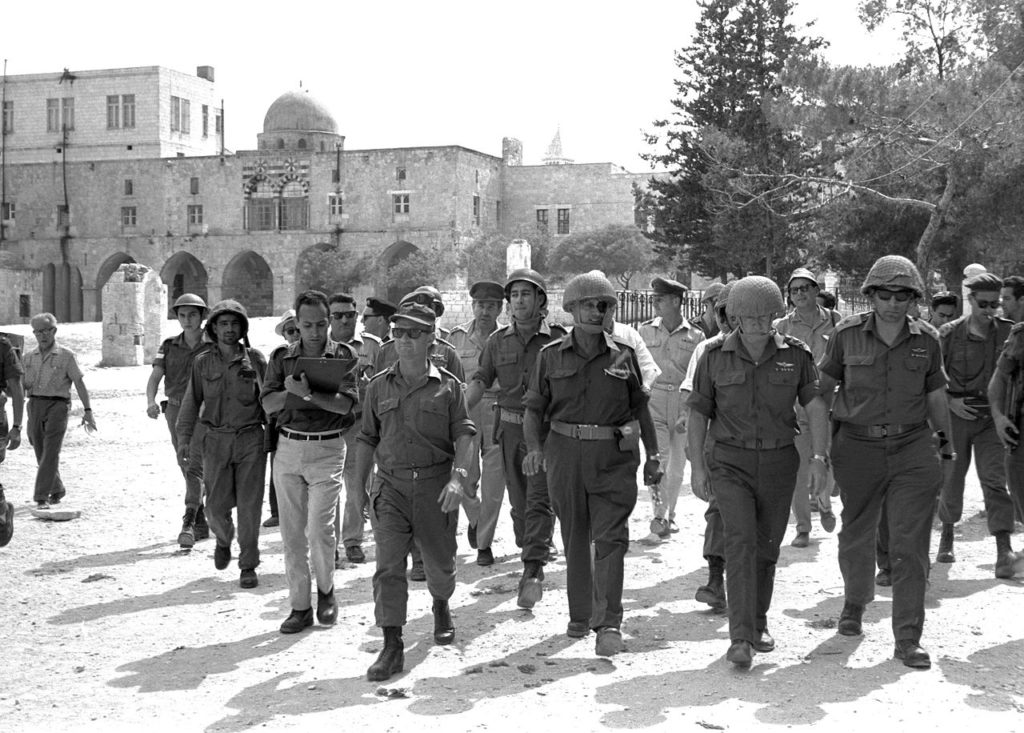On June 5, 1967, Palestinians around the world marked the 50th anniversary of Naksah, which is commonly known as the Six Day War. Occupation of the West Bank, Gaza Strip and Golan Heights were the immediate outcome of the war but the real impact is the total erasure of Palestine from the global map. In addition, the 1967 war added another group of Palestinians to the refugee roster. The 1967 War commenced a brutal occupation that continues to unfold, daily witnessing of the dehumanization of the population, and a sophisticated Israeli state campaign of structured violence directed at the occupied Palestinians.
The 1967 war commenced with a preemptive Israeli attack on Egyptian air force bases, which determined the outcome in few hours-time. This devastating initial Israeli blow was followed by a total routing of the combined Arab forces. Immediately after the war, Israel moved to annex Jerusalem and declaring it capital, an action that is in contravention of U.N. Resolution 181 and articles of the 4th Geneva Convention. Palestinians from the 1948 Nakba who had sought refuge in the West Bank and Gaza faced another assault and became stateless and occupied for a second time in less than 20 years.
Palestine is narrated through calendar dates and commemoration as if a collective effort is undertaken to make sure that each event causing the erasure is re-written over and over until it is permanently re-affixed into history. The commemoration becomes a way to narrate history and undo the erasure of Palestine. While official maps no longer have Palestine affixed on it, Palestinians and their allies around the globe take affirmative steps to glue it back into global consciousness. Israel may have erased the physical letters that read Palestine on a map but is unable to remove the meanings that are deeply rooted behind it. Even without being on a map, Palestine is permanently fastened in every town, city and landscape around the globe and more so today with through the BDS movement.
Commemoration is a collective effort to re-narrate the past so as to create living and breathing evidence of what Israel and Zionism have done to the Palestinians. Terms like Nakba, the 1948 ethnic cleansing, and the 1967 Naksah are engrained and seared into Palestinian consciousness. These two major events caused a rupture in modern Palestinian history, witnessing ethnic cleansing, massacres, systematic dispossession and dismantling of “normal” live. Post 1967, this was followed by a biting occupation, which is still unfolding daily. Palestinians lost 78% of historical Palestine in 1948 and the remaining 22% got devoured by Israel in the 1967 war.
The colonization, dispossession and expulsion of Palestinians was ushered with the Balfour Declaration some 100 years ago, which is another point of demarcation and commemoration in the modern history of Palestine. What Palestinian experience daily is the ravages of the last colonial project to be commissioned in partnership between Great Britain and the Zionist movement.
The daily lives of Palestinians have been shaped by these three critical historical events: the Balfour Declaration, the 1948 Nakba and the 1967 Naksah, which come straight from the Zionist settler colonial program. So here we are, already well into the 21st century, and yet our vocabulary relating to Palestine includes words like settlements, settlers, checkpoint, occupation, Separation Wall and Apartheid.
The consequences of the events in 1948 and 1967 are still with us and the international community bears responsibility for facilitating the systematic and structural dispossession of the Palestinian people. In addition, the issuing of the Balfour declaration by the U.K. in the early part of the 20th century made the commencing of the colonization program possible. Immediately after WWI, U.K. occupied Palestine, secured a Mandate Power over it and facilitated the mass entry of the Zionist movement into the country. The British role did not begin or stop in 1917, but still continues today.
Palestinians are competing with not just Israel in an equal symmetrical field, but also have been facing from the beginning an emboldened Zionism that was unquestionably supported by Western powers. Western powers have adopted the Zionist project and worked to facilitate its implementation, while making sure to target and frustrate Palestinians attempts to prevent and block their dispossession.
The commemoration of the 50th anniversary of the 1967 War comes at a time when the region and the world has become deaf and blind to the oppression of Palestinians. More importantly, the regional and global political order has shifted away from Palestine as the central conflict shaping Arab, Muslim and Western policies. It is abundantly clear that the regional alignment of Arab and Muslim political order has shifted with Israel and Zionism becoming the indispensable ally at the expense of the Palestinians. Furthermore, the raging wars in Syria, Yemen, Iraq, Afghanistan and Libya has caused the collapse of the old order to be replaced by one that integrates Israel as the regional hegemonic power that is ready to balance between the competing camps.
The regional chaos and the shifting regional order does not and will not translate in silencing or dispensing the Palestine file, the right of return and fundamental issues at the heart of the cause. On the contrary, the regional fragmentation and the strident entry of Israel into the fray, while beneficial to Zionism in the narrow lens, will lead to opening many new opportunities for narrating Palestine and Palestinians into the yet to emerge cracks. Palestine can’t be erased no matter what new bogyman is used to distract from the wholesale theft of a land and the expulsion of the Palestinian population. The 50th anniversary should be a reminder to everyone that Palestinians and Palestine are not going anywhere and the struggle to end colonization will not stop until freedom and dignity is achieved. Let’s be clear, colonialism is a dying enterprise and Palestine will emerge, no matter the facades and walls that are constructed to delay this.


